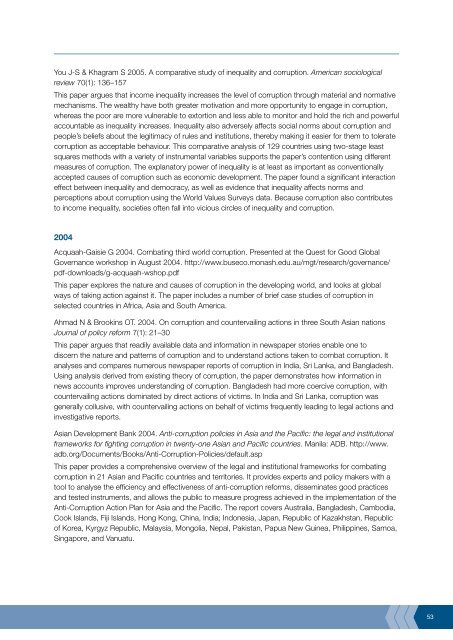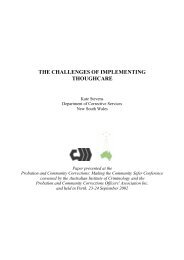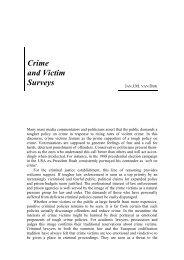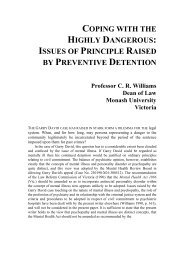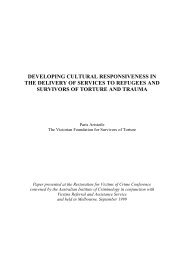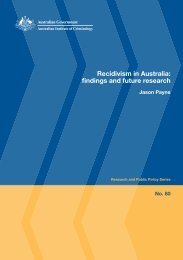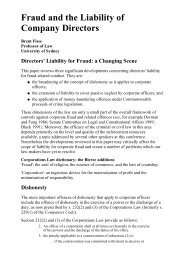Review of anti-corruption strategies Rob McCusker - Australian ...
Review of anti-corruption strategies Rob McCusker - Australian ...
Review of anti-corruption strategies Rob McCusker - Australian ...
Create successful ePaper yourself
Turn your PDF publications into a flip-book with our unique Google optimized e-Paper software.
You J-S & Khagram S 2005. A comparative study <strong>of</strong> inequality and <strong>corruption</strong>. American sociological<br />
review 70(1): 136–157<br />
This paper argues that income inequality increases the level <strong>of</strong> <strong>corruption</strong> through material and normative<br />
mechanisms. The wealthy have both greater motivation and more opportunity to engage in <strong>corruption</strong>,<br />
whereas the poor are more vulnerable to extortion and less able to monitor and hold the rich and powerful<br />
accountable as inequality increases. Inequality also adversely affects social norms about <strong>corruption</strong> and<br />
people’s beliefs about the legitimacy <strong>of</strong> rules and institutions, thereby making it easier for them to tolerate<br />
<strong>corruption</strong> as acceptable behaviour. This comparative analysis <strong>of</strong> 129 countries using two-stage least<br />
squares methods with a variety <strong>of</strong> instrumental variables supports the paper’s contention using different<br />
measures <strong>of</strong> <strong>corruption</strong>. The explanatory power <strong>of</strong> inequality is at least as important as conventionally<br />
accepted causes <strong>of</strong> <strong>corruption</strong> such as economic development. The paper found a significant interaction<br />
effect between inequality and democracy, as well as evidence that inequality affects norms and<br />
perceptions about <strong>corruption</strong> using the World Values Surveys data. Because <strong>corruption</strong> also contributes<br />
to income inequality, societies <strong>of</strong>ten fall into vicious circles <strong>of</strong> inequality and <strong>corruption</strong>.<br />
2004<br />
Acquaah-Gaisie G 2004. Combating third world <strong>corruption</strong>. Presented at the Quest for Good Global<br />
Governance workshop in August 2004. http://www.buseco.monash.edu.au/mgt/research/governance/<br />
pdf-downloads/g-acquaah-wshop.pdf<br />
This paper explores the nature and causes <strong>of</strong> <strong>corruption</strong> in the developing world, and looks at global<br />
ways <strong>of</strong> taking action against it. The paper includes a number <strong>of</strong> brief case studies <strong>of</strong> <strong>corruption</strong> in<br />
selected countries in Africa, Asia and South America.<br />
Ahmad N & Brookins OT. 2004. On <strong>corruption</strong> and countervailing actions in three South Asian nations<br />
Journal <strong>of</strong> policy reform 7(1): 21–30<br />
This paper argues that readily available data and information in newspaper stories enable one to<br />
discern the nature and patterns <strong>of</strong> <strong>corruption</strong> and to understand actions taken to combat <strong>corruption</strong>. It<br />
analyses and compares numerous newspaper reports <strong>of</strong> <strong>corruption</strong> in India, Sri Lanka, and Bangladesh.<br />
Using analysis derived from existing theory <strong>of</strong> <strong>corruption</strong>, the paper demonstrates how information in<br />
news accounts improves understanding <strong>of</strong> <strong>corruption</strong>. Bangladesh had more coercive <strong>corruption</strong>, with<br />
countervailing actions dominated by direct actions <strong>of</strong> victims. In India and Sri Lanka, <strong>corruption</strong> was<br />
generally collusive, with countervailing actions on behalf <strong>of</strong> victims frequently leading to legal actions and<br />
investigative reports.<br />
Asian Development Bank 2004. Anti-<strong>corruption</strong> policies in Asia and the Pacific: the legal and institutional<br />
frameworks for fighting <strong>corruption</strong> in twenty-one Asian and Pacific countries. Manila: ADB. http://www.<br />
adb.org/Documents/Books/Anti-Corruption-Policies/default.asp<br />
This paper provides a comprehensive overview <strong>of</strong> the legal and institutional frameworks for combating<br />
<strong>corruption</strong> in 21 Asian and Pacific countries and territories. It provides experts and policy makers with a<br />
tool to analyse the efficiency and effectiveness <strong>of</strong> <strong>anti</strong>-<strong>corruption</strong> reforms, disseminates good practices<br />
and tested instruments, and allows the public to measure progress achieved in the implementation <strong>of</strong> the<br />
Anti-Corruption Action Plan for Asia and the Pacific. The report covers Australia, Bangladesh, Cambodia,<br />
Cook Islands, Fiji Islands, Hong Kong, China, India; Indonesia, Japan, Republic <strong>of</strong> Kazakhstan, Republic<br />
<strong>of</strong> Korea, Kyrgyz Republic, Malaysia, Mongolia, Nepal, Pakistan, Papua New Guinea, Philippines, Samoa,<br />
Singapore, and Vanuatu.


